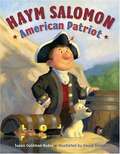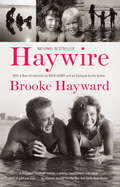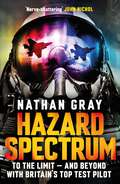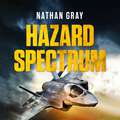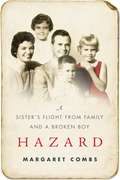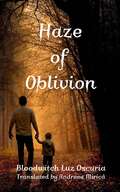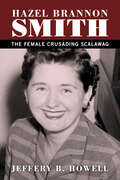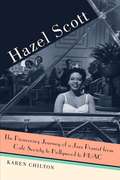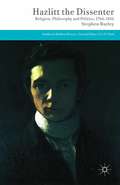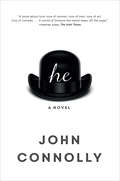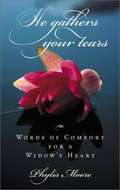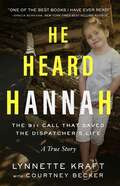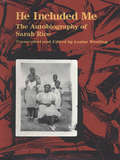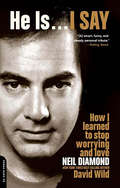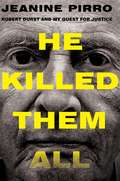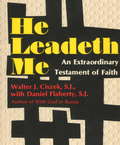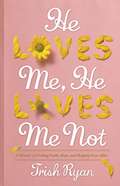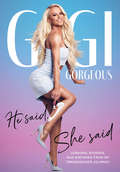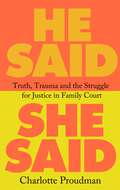- Table View
- List View
Hayley Okines - A Life to Celebrate
by Hayley OkinesHayley Okines was just like any other teenager: she loved clothes, shopping, and boy bands, and hated getting up in the morning. But she had progeria, which meant she aged eight times faster than normal, giving her the body of a 126-year-old. Her positive attitude and infectious smile charmed millions of people through her Extraordinary People TV documentaries.At the age of seventeen, in April 2015, Hayley tragically lost her battle to be the longest survivor of progeria, succumbing to pneumonia in the arms of her mother. This book tells Hayley’s story in her own words, continuing from the bestselling Old Before My Time. She reflects on the pains and perks of growing up with progeria – from the heartbreak of being told she will never walk again to the delight of passing her exams and starting college. Hayley considers mood swings, marriage, music, and what it’s like to be ‘famous’ and is heartbreakingly positive about a future that wasn’t to be.
Hayley Okines: A Life to Celebrate
by Hayley Okines Kerry Okines Alison StokesHayley Okines was just like any other teenager: she loved clothes, shopping, and boy bands, and hated getting up in the morning. But she had progeria, which meant she aged eight times faster than normal, giving her the body of a 126-year-old. Her positive attitude and infectious smile charmed millions of people through her Extraordinary People TV documentaries. At the age of seventeen, in April 2015, Hayley tragically lost her battle to be the longest survivor of progeria, succumbing to pneumonia in the arms of her mother. This book tells Hayley's story in her own words, continuing from the bestselling Old Before My Time. She reflects on the pains and perks of growing up with progeria - from the heartbreak of being told she will never walk again to the delight of passing her exams and starting college. Hayley considers mood swings, marriage, music, and what it's like to be 'famous' and is heartbreakingly positive about a future that wasn't to be.
Hayley Westenra: In Her Own Voice
by Hayley Westenra Darren HenleyHayley's first performance as 'Little Star' in a Christmas play was perfectly pitched, beautifully sung and enthusiastically received. She was six years old. Now, at the tender age of twenty, she is the fastest-selling debut classical artist ever. Her string of musical accolades is astonishing and her audiences range from royalty to premiers.This is her story, from her first performance, through later roles in major productions such as Annie, La Bohème and The Sound of Music, her decision at the age of eleven to busk for her lunch money, and the subsequent record deals, money, charity work and classical superstardom.
Haym Salomon: American Patriot
by Susan Goldman Rubin David Slonim<p>"The story of one of Americas first true patriots" <p>Everyone knows Revolutionary War figures George Washington, Benjamin Franklin, and Paul Revere, but Haym Salomon was also an important hero, and his accomplishments are finally gaining recognition in this biography that will entertain as it introduces its unique subject. Haym was one of the few Jewish patriots of the time. His knowledge of languages and currencies made him an exceptional man in pre-Revolution New York. <p>Incredibly valuable to the revolutionary cause, Haym risked his life and his fortune, went to prison, and was forced to abandon his home and family all for the sake of American independence. <p>Acclaimed author Susan Goldman Rubin, along with illustrator David Slonim, brings Hayms remarkable story to life.</p>
Haywire
by Brooke HaywardFrom the moment of its publication in 1977, Haywire was a national sensation and a #1 bestseller, a celebrated Hollywood memoir of a glittering family and the stunning darkness that lurked just beneath the surface. Brooke Hayward was born into the most enviable of circumstances. The daughter of a famous actress and a successful Hollywood agent, she was beautiful, wealthy, and living at the very center of the most privileged life America had to offer. Yet at twenty-three her family was ripped apart. Who could have imagined that this magical life could shatter, so conclusively, so destructively? Brooke Hayward tells the riveting story of how her family went haywire.From the Trade Paperback edition.
Hazard Spectrum: Life in The Danger Zone by the Fleet Air Arm’s Top Gun
by Nathan Gray'Nerve-shattering, enlightening and deeply moving' - JOHN NICHOL'A powerful and compelling read' - ROWLAND WHITEOn 5 December 2002, trainee pilot Nathan Gray walked away from an 'unsurvivable' crash at RAF Wittering in Cambridgeshire. His instructor, seated behind him, was killed instantly. Despite the physical pain and mental scars, he found the strength and resilience to continue his flying career. Today Commander Nathan Gray is one of the UK's elite test pilots - the best of the best. Hazard Spectrum allows us to share Nathan's dizzying journey to the top of the Fleet Air Arm. With over 140 combat missions to his name, he is among the most decorated pilots in the British armed forces - our very own Maverick. In an exhilarating first-person narrative, Nathan takes us inside the cockpit as he holds Taliban fighters at bay in Afghanistan, and leads a top-secret mission to seek out Osama Bin Laden in the mountains of the Hindu Kush.In 2018, Nathan was chosen to complete the first take-off and landing of the world's most advanced fighter aircraft - the F35 stealth jet - on the flight deck of the flagship HMS Queen Elizabeth. A television audience of millions held its collective breath as he geared up for the task. This is the inspiring and unforgettable story of a man with a supreme ability to fly the most sophisticated and deadly planes ever created, who overcomes his personal demons to push the hazard spectrum to the limit - and beyond.
Hazard Spectrum: Life in The Danger Zone by the Fleet Air Arm’s Top Gun
by Nathan Gray'Nerve-shattering, enlightening and deeply moving' - JOHN NICHOL'A powerful and compelling read' - ROWLAND WHITEOn 5 December 2002, trainee pilot Nathan Gray walked away from an 'unsurvivable' crash at RAF Wittering in Cambridgeshire. His instructor, seated behind him, was killed instantly. Despite the physical pain and mental scars, he found the strength and resilience to continue his flying career. Today Commander Nathan Gray is one of the UK's elite test pilots - the best of the best. Hazard Spectrum allows us to share Nathan's dizzying journey to the top of the Fleet Air Arm. With over 140 combat missions to his name, he is among the most decorated pilots in the British armed forces - our very own Maverick. In an exhilarating first-person narrative, Nathan takes us inside the cockpit as he holds Taliban fighters at bay in Afghanistan, and leads a top-secret mission to seek out Osama Bin Laden in the mountains of the Hindu Kush.In 2018, Nathan was chosen to complete the first take-off and landing of the world's most advanced fighter aircraft - the F35 stealth jet - on the flight deck of the flagship HMS Queen Elizabeth. A television audience of millions held its collective breath as he geared up for the task. This is the inspiring and unforgettable story of a man with a supreme ability to fly the most sophisticated and deadly planes ever created, who overcomes his personal demons to push the hazard spectrum to the limit - and beyond.
Hazard Spectrum: Life in The Danger Zone by the Fleet Air Arm’s Top Gun
by Nathan GrayOn 5 December 2002, trainee pilot Nathan Gray walked away from an 'unsurvivable' crash at RAF Wittering in Cambridgeshire. His instructor, seated behind him, was killed instantly. Despite the physical pain and mental scars, he found the strength and resilience to continue his flying career. Today Commander Nathan Gray is one of the UK's elite test pilots - the best of the best. Hazard Spectrum allows us to share Nathan's dizzying journey to the top of the Fleet Air Arm. With over 140 combat missions to his name, he is among the most decorated pilots in the British armed forces - our very own Maverick. In an exhilarating first-person narrative, Nathan takes us inside the cockpit as he holds Taliban fighters at bay in Afghanistan, and leads a top-secret mission to seek out Osama Bin Laden in the mountains of the Hindu Kush.In 2018, Nathan was chosen to complete the first take-off and landing of the world's most advanced fighter aircraft - the F35 stealth jet - on the flight deck of the flagship HMS Queen Elizabeth. A television audience of millions held its collective breath as he geared up for the task. This is the inspiring and unforgettable story of a man with a supreme ability to fly the most sophisticated and deadly planes ever created, who overcomes his personal demons to push the hazard spectrum to the limit - and beyond.'Nerve-shattering, enlightening and deeply moving' - JOHN NICHOL'A powerful and compelling read' - ROWLAND WHITE
Hazard: A Sister's Flight from Family and a Broken Boy
by Margaret CombsHazard is a poignant, unflinching memoir of the emotional intricacies of growing up with a severely disabled sibling. Margaret Combs shows how her Southern Baptist family coped with lived reality of autism in an era of ignorance and shame, the 1950s through the 1970s, and shares her own tragedy and anguish of being torn between helping her brother and yearning for her own life. Like many siblings of disabled children, young Margaret drives herself to excel in order to make up for her family’s sorrow and ultimately flees her family for what she hopes is a ?normal” life.Hazard is also a story of indelible bonds between siblings: the one between Combs and her sister, and the deep and rueful one she has with her disabled brother; how he and she were buddies; and how fervently she wanted to make him whole. Initially fueled by a wish that her brother had never been born, the author eventually arrives in a deeper place of gratitude for this same brother, whom she loves and who loves her in return.
Haze of Oblivion
by Bloodwitch Luz Oscuria“My name is Catherine. I'm 35 years old. I own an apartment in Paris, and I have a well-paid job. I also have a 5 year old son, William, and a golden nanny, Claire. I have everything it takes to be happy. And yet…” Being constantly checked by a psychologist, she tries to have a normal life amidst the moments when she loses ground between alcohol, depravity and blackouts. Being the sole witness to a murder in the convenience store where she usually does her grocery shopping, her already not so peaceful little life will be turned upside down in just one week.
Hazel Brannon Smith: The Female Crusading Scalawag
by Jeffery B. HowellHazel Brannon Smith (1914-1994) stood out as a prominent white newspaper owner in Mississippi before, during, and after the civil rights movement. As early as the mid-1940s, she earned state and national headlines by fighting bootleggers and corrupt politicians. Her career was marked by a progressive ethic, and she wrote almost fifty years of columns with the goal of promoting the health of her community.In the first half of her career, she strongly supported Jim Crow segregation. Yet, in the 1950s, she refused to back the economic intimidation and covert violence of groups such as the Citizens" Council. The subsequent backlash led her to being deemed a social pariah, and the economic pressure bankrupted her once-flourishing newspaper empire in Holmes County. Rejected by the white establishment, she became an ally of the black struggle for social justice.Smith's biography reveals how many historians have miscast white moderates of this period. Her peers considered her a liberal, but her actions revealed the firm limits of white activism in the rural South during the civil rights era. While historians have shown that the civil rights movement emerged mostly from the grass roots, Smith's trajectory was decidedly different. She never fully escaped her white paternalistic sentiments, yet during the 1950s and 1960s she spoke out consistently against racial extremism. This book complicates the narrative of the white media and business people responding to the movement's challenging call for racial justice.
Hazel Scott: The Pioneering Journey of a Jazz Pianist, from Cafe Society to Hollywood to HUAC
by Karen Chilton"Hazel Scott was an important figure in the later part of the Black renaissance onward. Even in an era where there was limited mainstream recognition of Black Stars, Hazel Scott's talent stood out and she is still fondly remembered by a large segment of the community. I am pleased to see her legend honored." ---Melvin Van Peebles, filmmaker and director "This book is really, really important. It comprises a lot of history---of culture, race, gender, and America. In many ways, Hazel's story is the story of the twentieth century." ---Murray Horwitz, NPR commentator and coauthor of Ain't Misbehavin' "Karen Chilton has deftly woven three narrative threads---Adam Clayton Powell, Jr., Harlem, and Hazel Scott---into a marvelous tapestry of black life, particularly from the Depression to the Civil Rights era. Of course, Hazel Scott's magnificent career is the brightest thread, and Chilton handles it with the same finesse and brilliance as her subject brought to the piano." ---Herb Boyd, author of Baldwin's Harlem: A Biography of James Baldwin "A wonderful book about an extraordinary woman: Hazel Scott was a glamorous, gifted musician and fierce freedom fighter. Thank you Karen Chilton for reintroducing her. May she never be forgotten." ---Farah Griffin, Institute for Research in African-American Studies, Columbia University In this fascinating biography, Karen Chilton traces the brilliant arc of the gifted and audacious pianist Hazel Scott, from international stardom to ultimate obscurity. A child prodigy, born in Trinidad and raised in Harlem in the 1920s, Scott's musical talent was cultivated by her musician mother, Alma Long Scott as well as several great jazz luminaries of the period, namely, Art Tatum, Fats Waller, Billie Holiday and Lester Young. Career success was swift for the young pianist---she auditioned at the prestigious Juilliard School when she was only eight years old, hosted her own radio show, and shared the bill at Roseland Ballroom with the Count Basie Orchestra at fifteen. After several stand-out performances on Broadway, it was the opening of New York's first integrated nightclub, Café Society, that made Hazel Scott a star. Still a teenager, the "Darling of Café Society" wowed audiences with her swing renditions of classical masterpieces by Chopin, Bach, and Rachmaninoff. By the time Hollywood came calling, Scott had achieved such stature that she could successfully challenge the studios' deplorable treatment of black actors. She would later become one of the first black women to host her own television show. During the 1940s and 50s, her sexy and vivacious presence captivated fans worldwide, while her marriage to the controversial black Congressman from Harlem, Adam Clayton Powell, Jr., kept her constantly in the headlines. In a career spanning over four decades, Hazel Scott became known not only for her accomplishments on stage and screen, but for her outspoken advocacy of civil rights and her refusal to play before segregated audiences. Her relentless crusade on behalf of African Americans, women, and artists made her the target of the House Un-American Activities Committee (HUAC) during the McCarthy Era, eventually forcing her to join the black expatriate community in Paris. By age twenty-five, Hazel Scott was an international star. Before reaching thirty-five, however, she considered herself a failure. Plagued by insecurity and depression, she twice tried to take her own life. Though she was once one of the most sought-after talents in show business, Scott would return to America, after years of living abroad, to a music world that no longer valued what she had to offer. In this first biography of an important but overlooked African American pianist, singer, actor and activist, Hazel Scott's contributions are finally recognized. Karen Chilton is a New York-based writer and actor, and the coauthor of I Wish You Love, the memoir of legendary jazz vocalist Gloria Lynne.
Hazlitt the Dissenter
by Stephen BurleyHazlitt the Dissenter is unique in providing the first book-length account of Hazlitt's early life as a dissenter. As the first multi-disciplinary account of Hazlitt's early literary career, it provides a new insight into the literary, intellectual, political and religious culture of the late eighteenth and early nineteenth century.
Hazrat Mohammad Payagambar
by Arunika Manoj Daruહજરત મહંમદ પયગંબર એ નવજીવન દ્વારા પ્રકાશિત સંતવાણી ગ્રંથાવલિનું નવમું પુસ્તક છે. સંતવાણી ગ્રંથાવલિ એ ભારતના મહાનુભાવોના જીવન અને વિચારને વાચક સુધી પહોંચાડવાનો નવજીવન ટ્રસ્ટનો નમ્ર પ્રયાસ છે.
He
by John ConnollyJohn Connolly recreates the Golden Age of Hollywood in this moving, literary portrait of two men who found their true selves in a comedic partnership. When Stan Laurel was paired with Oliver Hardy, affectionately known as Babe, the history of comedy--not to mention their personal and professional lives--would be altered forever.Laurel followed in the wake of Charlie Chaplin, who blazed a trail from the vaudeville stages of England to the dynamic, if often seedy and highly volatile, movie studios of Los Angeles in the early 20th century. Awed like everyone else by Chaplin's genius (and ambition and cruelty), Laurel despaired of ever finding his own path to success--or happiness.But success and happiness did find Laurel, following the inspired decision by impresario Hal Roach to put him and Oliver Hardy together on screen. Initially a calculated marriage of opposites in an era of highly disposable short films, the partnership bloomed into a professional and personal relationship of lifelong depth. Eventually, Laurel became one of the greatest screen comedians the world has ever known: a man who knew both adoration and humiliation; who loved, and was loved in turn; who betrayed, and was betrayed; who never sought to cause pain to anyone else, yet left a trail of affairs and broken marriages in his wake. And whose life was ultimately defined by one relationship of such astonishing tenderness and devotion that only death could sever their profound connection.
He Gathers Your Tears Words of Comfort for a Widow's Heart
by Phylis MooreThis is an excellent book written through the grieving period of a widow. Phylis Moore intersperses daily journal reflections with Scripture to offer comfort for the hardship described.
He Heard Hannah: The 911 Call That Saved the Dispatcher's Life
by Lynnette Kraft Courtney BeckerLynnette Kraft hoped she’d had her share of suffering with the death of two infant sons and a complicated congenital diagnosis for her daughter, Anna. But six years later, Anna, too, is called home, and Lynnette is, once more, thrust into a world of grief, wondering if she’ll ever be able to reconcile God’s purpose in her heartache.When she receives an unexpected letter from Courtney Becker, the 911 dispatcher who took the call that fateful morning, Lynnette is given a chance to see, firsthand, the transformative power of suffering.A divinely orchestrated tale of trial and perseverance—hopelessness and restoration.
He Included Me: The Autobiography of Sarah Rice (Brown Thrasher Books Ser.)
by Sarah RiceThe dramatic and colorful autobiography of a Black woman born in 1909 in rural Alabama. A rare first-person account of life in the twentieth-century South, He Included Me weaves together the story of a black family—eight children reared in rural Alabama, their mother a schoolteacher, their father a minister—and the emerging self-portrait of a woman determined, like her parents, to look ahead. Sarah Rice recalls her mother&’s hymn of thanks—&“He Include Me&”—when God showed her a way to feed her family, and hears again her mother's quiet words, &“It's no disgrace to work. It's an honor to make an honest dollar,&” spoken when her children were embarrassed that she took in white people&’s laundry. Rice speaks, finally, of the determination, faith, and pride that carried her through life. In a document that spans more than three-quarters of the twentieth century, He Included Me presents the voice of a single woman whose life was rich in complexity, deep in suffering and joy; yet it also speaks for the many black women who have worked and struggled in the rural South and always looked ahead. &“In the oral tradition of Theodore Rosengarten&’s All God&’s Dangers…It&’s a moving story that reveals a hidden corner of American life.&”—New York Times &“Viewing her life with a sharp intelligence, always frank, compassionate, and informed by a deep religious faith, Rice offers an autobiography that often reads with the narrative sweep of a novel.&”—Library Journal &“A unique contribution to a growing history of African American women.&”—Atlanta History
He Is . . . I Say: How I Learned to Stop Worrying and Love Neil Diamond
by David WildHe Is...I Say examines Neil Diamond's singular place in the pantheon of popular music. David Wild-who has written about Diamond for Rolling Stone, penned the liner notes to a number of Diamond's anthologies, and produced Diamond's scandal-free episode of Behind the Music. Now he dares to turn on his "Heartlight," offering a moving and hilarious salute to his own Jewish Elvis based on his past interviews with the Solitary Man himself.An illuminating snapshot of a beloved American icon, He Is...I Say endearingly speaks to the condition of being a Diamondhead in a hipper-than-thou world, while fully illustrating exactly what it is that makes the man and the artist so special.
He Killed Them All: Robert Durst and My Quest for Justice
by Jeanine PirroFormer prosecutor Jeanine Pirro--the "true hero" (New York Post) of the hit HBO documentary series The Jinx--offers the transfixing true story of her tireless fifteen-year investigation into accused murderer Robert Durst for the disappearance of his wife Kathleen Durst.Former district attorney Jeanine Pirro was cast as the bad guy fifteen years ago when she reopened the cold case of Kathleen Durst, a young and beautiful fourth-year medical student who disappeared without a trace in 1982, never to be seen again. Kathie Durst's husband was millionaire real estate heir Robert Durst, son of one of the wealthiest families in New York City--but though her friends and family suspected him of the worst, he escaped police investigation. Pirro, now the host of Justice with Judge Jeanine on Fox News, always believed in Durst's guilt, and in this shocking book, she makes her case beyond a shadow of a doubt, revealing stunning, previously unknown secrets about the crimes he is accused of committing. For years, Pirro has crusaded for justice for the victims, and her impassioned perspective in the captivating HBO documentary series The Jinx made her one of its breakout stars. Featuring Pirro's unique insider's perspective on the crimes, as well as her exclusive interviews with many of the major players featured in the The Jinx, this comprehensive book is the definitive story of Robert Durst and his gruesome crimes--the one you didn't see on television.
He Leadeth Me
by Walter J. CiszekHe Leadeth Me is the deeply moving personal story of one man's spiritual odyssey and the unflagging faith which enabled him to survive the horrendous ordeal that wrenched his body and spirit to near collapse. Captured by the Russian army during World War II and convicted of being a "Vatican spy," American Jesuit Father Walter J. Ciszek spent some 23 agonizing years in Soviet prisons and the labor camps of Siberia. He here recalls how it was only through an utter reliance on God's will that he managed to endure. He tells of the courage he found in prayer-a courage that eased the loneliness, the pain, the frustrations, the anguish, the fears, the despair. For, as Ciszek relates, the solace of spiritual contemplation gave him an inner serenity upon which he was able to draw amidst the "arrogance of evil" that surrounded him. Learning to accept even the inhuman work of toiling in the infamous Siberian salt mines as a labor pleasing to God, he was able to turn adverse forces into a source of positive value and a means of drawing closer to the compassionate and never-forsaking Divine Spirit. He Leadeth Me is a book to inspire all Christians to greater faith and trust in God-even in their darkest hour.
He Loves Me, He Loves Me Not: A Memoir of Finding Faith, Hope, and Happily Ever After
by Trish RyanTrish Ryan was the quintessential successful thirtysomething woman -- she had a career as an attorney, a nice car, and a succession of men clamoring for her affection. But despite all her accomplishments, the things by which she defined her life continually left her disappointed, especially when it came to dating. Like the heroines of chick-lit novels and Sex and the City, she couldn't escape her bad luck with men: men who cheated, who left her, who made her a lesser version of herself. After years of trying everything out there to make love work -- new age philosophy, feminist empowerment, myriad of self-help programs -- she finally, hesitantly, decided to give God a try. This is Ryan's story of how her search for the right guy turned into the search for the right God, and (spoiler alert!) how she ended up with the happily-ever-after ending.
He Said, She Said: Lessons, Stories, and Mistakes from My Transgender Journey
by Gigi GorgeousToday, Gigi Gorgeous is beloved for her critically-acclaimed documentary, her outrageous sense of humor, her no-holds-barred honesty, and her glam Hollywood lifestyle. Ten years ago, she was a gawky Canadian teen named Gregory. In He Said, She Said, Gigi brings us on her personal journey from Gregory to Gigi, going deeper than ever before and exposing her vulnerability behind each struggle and triumph, with her signature humor on every page. With stunning photography and heirloom snapshots, He Said, She Said takes us back to Gigi’s early years as an Olympic-bound diver and high school mean girl, losing her mom at a tragically young age, and her journey of opening up about her sexuality and gender identity. She walks us through her transition, baring it all about dating and heartbreak in her stories of falling in love with both men and women. Uproarious, unconventional, and unabashedly candid, Gigi shares never-before-heard stories, inspiration, and advice about how your life can take you to incredible places once you get real with yourself.
He Said, She Said: Truth, Trauma and the Struggle for Justice in Family Court
by Dr Charlotte ProudmanIf you and your family needed help, could you trust the law to be on your side?Award-winning barrister Charlotte Proudman has dedicated her working life to representing women who find themselves in need of help from the family law courts. Time and again, she has watched as these women are let down by the system that is supposed to protect them. Seeking only justice and safety, they have instead been met with cruelty and disdain, deemed unreliable witnesses compared to the men who abused them.From family courts failing to protect victims from abusers to the misogynistic bullying Charlotte herself receives from senior members of her profession, the problem is clear: no matter their circumstances, women across the country are suffering at the hands of a legal system built by men.But change is on the horizon. In He Said, She Said, Proudman gives voice to the women whose stories are all too often brushed aside in the name of giving abusers 'the benefit of the doubt'. Through real-life cases spanning forced marriage, domestic abuse, child abduction and female genital mutilation, Proudman highlights the troubling biases and shocking prejudice that underlie our legal system - and in a book that is at once thrilling, engaging and deeply compassionate, puts forward her own inspiring vision for long-term change.
He Sets the Captive Free
by Corrie Ten BoomDesigned to guide prisoners toward the Christian life, this book presents a number of the author's own experiences in three of the world's most brutal prisons and concentration camps. Also included are conversations that ten Boom had with men and women in various prisons that she traveled to following her own miraculous release. This devotional presents numerous aspects of Christian living including salvation, guilt and sin, finding joy, and the fruit of the Spirit.



